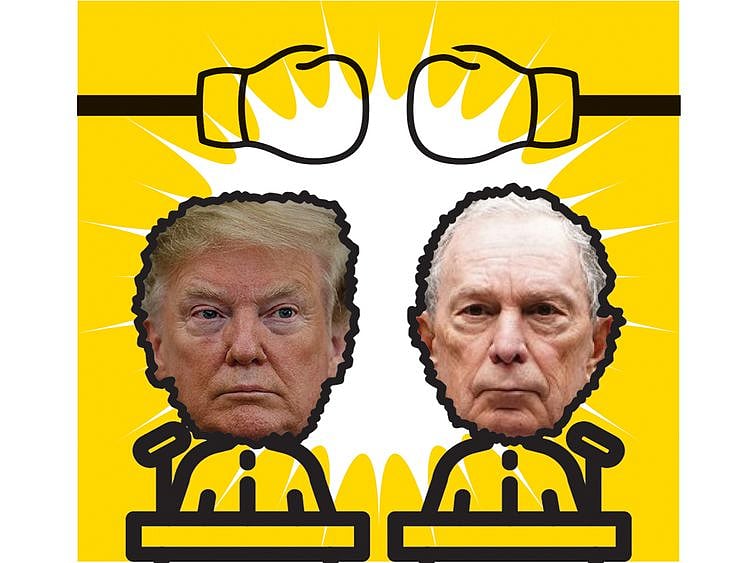This should be a happy time for former New York Mayor Michael Bloomberg. Right now, his ads are drowning the airwaves in the 14 states that will vote on Super Tuesday, March 3, while in most of those states, the campaigns of his non-billionaire opponents for the Democrats’ presidential nod have barely begun.
As the campaign rolls on, however, Democratic voters will learn more about Bloomberg’s actual record. The mass incarceration in black and brown communities that resulted from police practices he put in place as mayor; the pre-emptive arrests he authorised of people who sought to protest the 2004 Republican convention in New York (for which the city had to pay hefty fines for false arrests).
His defence of Wall Street bankers in the wake of the 2008 financial panic (he termed the fines levied against banks for misconduct “outrageous”) these are just some of the many Bloomberg policies and positions that should give Democrats pause.
Even so, some Democrats may be willing to overlook that Bloomberg governed and in many ways still thinks like a Republican because they believe he has the best chance to unseat President Trump in November.
But he doesn’t. Indeed, he can’t.
Minority alert
It’s hard to imagine a Democrat less able to win working-class votes those of young black and Latino workers, and those of the white workers who swung the 2016 election to Trump.
Minority voters are unlikely to look kindly on his mayoral record: intensifying stop-and-frisk, vetoing legislation that banned predatory lenders from doing business with the city, and opposing city legislation to raise the living wage.
Now that he’s running for president he says he backs a minimum wage hike, but in 2014, he told Fox News, “I’ve always thought that this impetus to raise the minimum wage is one of the most misguided things we can do.”
For those white workers who pushed Wisconsin, Michigan and Pennsylvania into Trump’s column, Bloomberg is the personification of everything they can’t abide. On one hand, he’s perhaps America’s biggest-spending proponent of gun control and a prominent advocate for other socially liberal positions those the right denigrates as heralding “the nanny state.”
On the other, he’s been a constant advocate for deepening economic globalisation, for the very trade deals many American workers believed decimated manufacturing here. To this very day, he remains, with Henry Kissinger, the American public figure most supportive of the Chinese regime.
China connection
Bloomberg’s interest in China is also financial. As Josh Rogin has reported in the Washington Post, Bloomberg LP doesn’t only sell its terminals there, but through the Bloomberg Barclays Global Aggregate Bond Index, it enables US investors to buy Chinese bonds.
Last year, Rogin noted, “the index began a 20-month plan to support 364 Chinese firms by directing an estimated $150 billion into their bond offerings.” This is the same government that subsidises its steel industry, allowing it to undersell the American steel industry with devastating effect. It has done the same with solar panels, at a time the US industry was gearing up. And on and on.
Does anyone think that, if it comes down to a Trump-Bloomberg race, the president won’t attack Bloomberg’s ongoing role in boosting China’s industries, while touting his own economic nationalism? Does anyone think that Bloomberg could carry the industrial Midwest with a record like that?
Money power
In the wake of the New Hampshire primary, the punditocracy is busily engaged in pointing out Bernie Sanders’ electoral vulnerabilities, and he surely has some, as do all the Democratic candidates and as, most surely, does Trump.
Ironically, however, it is the socialist Sanders who has condemned China, while Bloomberg retains a friendly relationship with the country. It’s capitalists Bloomberg and Trump, not democratic socialist Sanders, who are the fellow travellers of 21st century dictatorships. It’s Bloomberg, not Bernie, who’s the Manchurian candidate.
The normally fractious Democrats have been nonetheless united in recent years against the growing control that money exerts over our politics and democracy. Bloomberg’s candidacy has seduced some Democrats away from that consensus in the hope that at least he can defeat Donald Trump.
Stray no more, Democrats. He can’t.
Los Angeles Times
Harold Meyerson is a columnist and editor at large of the American Prospect.
Also Read
Presidential hopeful Bloomberg promises ‘open office’ White HouseThe Bloomberg temptation in US presidential raceFormer New York mayor Bloomberg not running for presidentDemocrats look ahead from Nevada and see a common enemy: BloombergNetwork Links
GN StoreDownload our app
© Al Nisr Publishing LLC 2026. All rights reserved.
